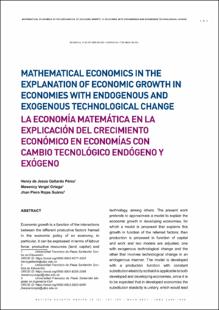Mathematical economics in the explanation of economic growth in economies with endogenous and exogenous technological change
...
Vergel Ortega, Mawency | 2021-05-01
Economic growth is a function of the interactions
between the different productive factors framed
in the economic policy of an economy, in
particular, it can be expressed in terms of labour
force, productive resources (land, capital) and technology, among others. The present work
pretends to approximate a model to explain the
economic growth in developing economies, for
which a model is proposed that explains this
growth in function of the referred factors; then
production is proposed in function of capital
and work and two models are adjusted, one
with exogenous technological change and the
other that involves technological change in an
endogenous manner. The model is developed
with a production function with constant
substitution elasticity so that it is applicable to both
developed and developing economies, since it is
to be expected that in developed economies the
substitution elasticity is unitary, which would lead to a Cobb-Douglas-type production function, but
it is very probable that in incipient economies the
function with constant substitution elasticity better
reflects the relationship between production
factors and economic growth. The research
allows the development of the corresponding
mathematical model in each case, the economic
and mathematical foundations of each model are
presented and validated according to economic
theories. The behaviour of variables such as
savings, investment, income, consumption,
capital and their relationships in each model is
analysed.
LEER










